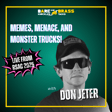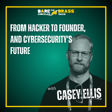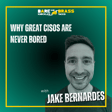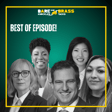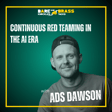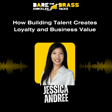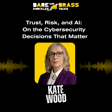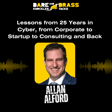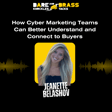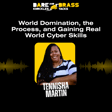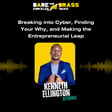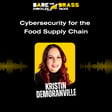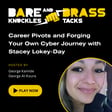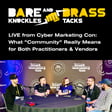Understanding the Full Sales Cycle
00:00:00
Speaker
Yeah, I think storytelling is the first part. And understanding the entire cycle is really important. Because the cycle doesn't end when you sign the deal. What's now? Now we need to implement. I remember very clearly a conversation we had with a sister of a medium-sized company, a few thousand people. And we showed that CISO, like, the results, the risk assessment after they signed. And I was so proud. I was so happy. I said, look.
00:00:29
Speaker
I said, no, I'm not so happy. Now I need to go and fix it. And the psychology is totally different between I signed a deal, I'm happy, but he or she are not happy because now they need to work. So you need to understand the entire cycle, not only the marketing side, the sales side, there's implementation, there's growing together, there's growing pains, there's so many things for the long term partnership that are extremely important from the one.
Podcast Introduction and Host Background
00:00:59
Speaker
Yo, yo, yo, it's the show. This is Bare Knuckles and Brass Tax, the cybersecurity podcast that tackles all the messy human bits in cybersecurity, trust, respect, and all the rest. I am George Kaye on the vendor side. And I'm George A., a Chief Information Security Officer.
00:01:14
Speaker
And today our guest is Ofer Klein, co-founder and CEO at Ricoh AI.
Ofer Klein's Transition to Cybersecurity
00:01:20
Speaker
And this is a really in the weeds discussion with a startup founder, which we don't often get. Often they're afraid to talk to us. So happy to have a more candid discussion about what goes into founding and um how they go about building trust and trying to find a sales team that actually agrees with that same philosophy.
00:01:43
Speaker
Yeah, I mean, what I really enjoyed though was the ah diversity of his background and really kind of explaining how someone can kind of cross section industries and actually get into security and utilize good business skills, good business acumen to create a product that actually is innovative within the security market.
Industry Relationships and Marketing in Cybersecurity
00:02:02
Speaker
and then you know You know, full disclosure to everyone, we do have a good relationship with Rico. Merritt Bear is a very good friend of ours, a good friend of the show. They have a really good marketing team out there. um You know, we've attended their events. it's It's definitely one of those companies to keep an eye on. and And Ofer was a very good representative of it tonight. Yeah, I totally forgot. He came from e-commerce, not one of the serial cyber entrepreneurs who have fresh perspective on things. So let's turn it over to Ofer Klein.
Transition Challenges from E-commerce to Cybersecurity
00:02:33
Speaker
Ofer Klein, welcome to Bare Knuckles and Brass Tax. Thank you so much. Thank you for having me. Yeah, we're happy to have you and because you are on the vendor side firmly as co-founder and CEO, I will take it and give it over to the CISO for the first crack.
00:02:52
Speaker
o for Thank you for joining us on the show. It's really good to finally meet you. We love Merit. She's a close dear friend of the show and us personally. Andrea's great. We've spent time with them on numerous occasions in the last year. You have a very, very good taste in picking good staff. So my compliments to you.
00:03:09
Speaker
um Let's start this off, though. um How did you make the transition from e-commerce tooling to so to security? I mean, was it an easy crossover for you? Because I know when i'm when I'm dealing with a lot of people, I often have to train a lot of new analysts and new personnel who are coming from different career fields into security. And I know that an operator level, it's an extremely difficult thing to take on.
00:03:34
Speaker
Now, at the VC CEO level, where you're now putting your money where literally your mouth is, how do you do that and successfully pull it off and and somehow make that transition look seamless?
Building a Cybersecurity Startup: Insights and Learnings
00:03:47
Speaker
Yeah, that's a great question. Actually, the transition from e-commerce to cyber was my second transition. ah The first one was from the defense electronic business into e-commerce, which I knew nothing about e-commerce. And then again, from e-commerce to cyber. I think the starting point is my background is as a helicopter pilot, you basically learn how to learn quickly.
00:04:08
Speaker
You know that you know nothing, and you need to learn quickly to adopt into new situations. And the first step into e-commerce was pretty much the same. I had no clue about the worldwide business and the Procter & Gamble and Kimberly Clark, and you have to learn from scratch. This is a very close industry, pretty much the same as cybersecurity.
00:04:29
Speaker
And when I understood I want to do something new, when I met my two co-founders, they are like hardcore cybersecurity people. One of them is AI, PhD. Another one was an attacker. Both of the lieutenant coloners in the Israeli FBI, they are 100% cybersecurity people.
00:04:46
Speaker
And it was a big question, can I adopt to this ah new atmosphere and how? And I think one of the most important thing is to know that you don't know and to be able to learn, ah to admit you don't know. And I remember the first days before starting the company,
00:05:03
Speaker
they effectively starting to teach me what is cybersecurity. So I know how to sell, I sold multiple times, I know how to deal with ah people, I manage people and I was not an expert in cybersecurity. So you need to start learning from a close circle and then expand it and mainly to listen, to listen to customers, to listen to prospects, to listen to partners and translate it into what you already know.
Selling to Big Enterprises: Navigating Company Politics
00:05:30
Speaker
Um, so you are, as you mentioned, a serial entrepreneur. I mean, this might be the first foray into cyber, but you've gone through several go to market motions. This is the bare knuckles portion of the show, which is typically where we kind of confront common challenges or just air grievances, I guess. So while your co-founders are teaching you about cyber, I'm curious, what do you think you're teaching them or.
00:05:57
Speaker
trying to pass on to them what you have learned about go to market strategy. Because it strikes me that if they came from cyber world and they're familiar with their colleagues who may or may not have also started cyber startups, so there's kind of a typical go to market motion there. And you know, just what is that difference? And what is what have you been able to teach them? Yeah, so one thing I've done multiple times before starting the startup is setting to a big enterprises.
00:06:24
Speaker
Walmart, Procter & Gamble, Kimberly Clark, Nestle, Clorox, you name it. So how to understand who is a champion, how to decipher who is doing what, the politics, ah how to communicate within the company, how to make your champion a hero, all of those things that selling to a big enterprise takes a long time at the beginning.
00:06:46
Speaker
ah to learn, but once you have achieved it again and again, L'Oreal globally, um you know those type of companies, then you can start you know taking that into your new role, in this case, cybersecurity. So ah selling to big enterprises, selling to medium-sized enterprises, finding the champion, all of the sales cycle motion is extremely important. And to be honest, it's pretty much the same. It's a different language. It's a different technology.
00:07:15
Speaker
But psychology is psychology people are people until AI takes control of everything we do. So that's the same thing.
Economic Challenges in Cybersecurity Post-COVID
00:07:26
Speaker
um So I have to ask them because, you know, We have lived in a very difficult era in the last few years, from an economic standpoint, particularly within the security industry, as I'm sure you've seen. you know How have you found dealing with the ups and downs of the security business, specifically in the post-COVID high interest rate era, where we have had regular cuts, budgetary drawbacks,
00:07:52
Speaker
and simply firms that are failing to manage to get obviously Rico's gone to market. But you have firms that just fail to launch. How have you managed to navigate those tides as a relatively new person in cyber?
00:08:04
Speaker
Yes, I remember in my previous company, I was back and forth into Silicon Valley, like every two weeks, I lived back then in Israel and then New York. And I remember so vividly seeing like at that time of babble burst, when you start seeing no cars on the road, no traffic jams, all of those things, amazing startups of good friends shutting down.
00:08:27
Speaker
And the main lesson learned was you're strong now, but you will not be strong forever. You need to listen and you need to try to sniff and to expect the next big things. And we started seeing it here as well. And actually in Israel, we we had great we still have great investors. We got significant funding, like $40 million. dollars And we grew too quickly.
00:08:52
Speaker
And we saw that and we were one of the first startups in our you know community that let had to let go of people. Not because they were bad people, amazing people. But we looked two steps ahead and we were growing too fast. So it was like one and a half years ago and we basically took the company and we understood what do we need to do in order to be successful for the long term.
00:09:16
Speaker
And we made the right adjustments at the right time. So those kind of things, unless you do it the second time or the third time, it's really hard to recognize.
Adjusting Growth Strategy to Business Realities
00:09:26
Speaker
It's not that you are so smart. You just saw it again. You saw all of those same marks. And you say, OK, it sounds familiar.
00:09:35
Speaker
Now we need to act. Can you um elaborate a little bit, like walk me through the process of what did that expansion look like? Like, where did you expand? And then what is the signal that you saw that you had that moment of recognition, like, oh, this is too fast, too quickly, you know, and walk me through the contraction to like,
00:09:56
Speaker
okay If we don't expand here, we actually contract and we place our bets and our money here. I really am very intrigued by this this process and experience. Sure. so Our core team is extremely smart. We have multiple PhDs in AI. We have like very, very talented people that had six or seven job offers and came to Rico. These days, it was money was almost free.
00:10:26
Speaker
And the main thing that you were judged by is can you attract a plus people? And this is something we did amazingly and we hired and hired and hired. And then we saw we saw our business compared to how many people we hired. And it was a misalignment and it took us a few months. It's not like, Hey, one day, okay, let's solve it tomorrow because did I make a mistake? No, no way. Not me. Yes. I did a mistake. I made a mistake.
00:10:55
Speaker
And I need to think how we grow this company in a healthy way for long-term. And we had first to recognize, then to align within the founders and to communicate it to the company. Because if you're doing it wrongly, you can actually destroy the DNA of the company. Yeah. yeah i've seen people I've seen that.
00:11:18
Speaker
If you're doing it too broad, too late, with you know in a process that people cannot understand, I can give you an example, obviously, without names. Someone extremely talented. He had literally six offers. Most of them were 20% to 30% higher salary with what we offered. He joined the company, and three and a half weeks later, we let him go. He said, what? Are you crazy? What have you done?
00:11:44
Speaker
we obviously helped him find an amazing other job and he found like a job another job like you know, in a week. But these type of hard decisions, you need to look in the mirror and say, is it the right thing for the company or not? Yeah, I mean, I I think that it's easier said than done. I think a lot of people say like, oh, as a founder, you have to recognize your mistakes. But I have seen this movie before where that decision is not made, but like six months later after a lot of runway has been burned and things like that. So after you made that decision, OK, we are revenue is not keeping pace with you know our hiring costs.
00:12:26
Speaker
and you decided to contract, what then was the decision about like where you needed to place your investment? If it wasn't in going after all these people, it seems like you realigned the target interest of the the company's operations and where was that? Was it in the product development? Was it in customer acquisition? like Where did the priority shift to?
Finding Product-Market Fit in Cybersecurity
00:12:46
Speaker
Yeah, so the the first step was we need to buy enough time to go on the hockey stick curve. That's number one. Number two, we need to have a better balance between R and&D AI product people and go-to-market people. Back then, we had only one salesperson, and most of the company was developers.
00:13:07
Speaker
was R and&D people were AI people. ah So we need to shift the center of gravity towards go to market. We need to focus and focus means what things we will not do. What are we going to say no to?
00:13:26
Speaker
productwise product roadmap-wise, et cetera. And only once we got all of that, now you need to go and to iterate with the market and to listen again. Because maybe I'm wrong. Maybe I thought of focusing on A versus B is the wrong thing. So you need to quickly iterate while doing that and listen to the market saying, this is my right decision.
00:13:48
Speaker
Nice. A little bit more on the listening. Does that mean you and the and the other founders are listening to those customer calls, to the ah to the outbound outreach? like Where is the part where you are feeling the most signal when you're when you talk about listening?
00:14:07
Speaker
so So the best way is listening to actual customers. um A lot of people, we have amazing advisors, for example. We have many private investors that sold companies, super smart people. That is one type of advice. And someone that has a wallet and need a pain is a different type of ah discussion. Will you actually take action and buy this product?
00:14:31
Speaker
or what is missing. And what we understood is that we have built the hard part of so security, and we were missing on another part, which is today, and in the SSPM, the Subsecurity Posture Management, the configuration, which is dramatically easier to to make. And we started on the on the hard part. Now we are the only one having everything. So we shifted the focus towards completing what we were missing.
00:14:56
Speaker
And once we did that, basically started running like crazy. and And identifying that missing part was the, you're saying was the result of listening, like customers were like, it's great if it could also do this. Is that how you found that missing piece? We we called it internally, we need to be invited to the party. The party back then and still today is the SSPM or the something that the customers want first and then they add more things. And basically getting invited to the kind to the party And then winning in the party is by having everything else. nice I remember, for example, before changing, we had meetings with customers like two years ago, two and a half years ago. They didn't even understand what we do. And it's of course because they're stupid. They don't know anything. I'm so smart and amazing. No, think again. You need to change something in order to fit yourself to the market.
00:15:51
Speaker
Oh, we're going to we'll explore that further. that's That's a really good one, but we'll come back to that after the break.
00:16:03
Speaker
Hey listeners, if you like what we do, the snark, the stories, and the big swings we take, we'd appreciate your support. With the link in the show notes, you can become an official supporter of the show. You can send us a one-time gift or sign up as a member to provide ongoing support. Memberships start for as little as $1 per month. Each membership tier comes with a unique set of benefits, including exclusive discounts to the BKBT swag shop. So really, for less than you'd pay for one cup of coffee per month, you can support the show. Use the link in the show notes. It covers our hosting fees, helps us make cool swag, and it lets us know that what we're doing is of value to you.
00:16:45
Speaker
Many thanks to recent supporters Jessica, Jason, and Maria. We'd love to have yours too.
00:16:54
Speaker
And we're back. So we're now going at the brass tax portion of the show. It's time to pick Ofer's brain to see how we can actually make the industry experience a little bit better. And it's interesting from the founder perspective here.
Improving Go-To-Market Strategies with Trust and Transparency
00:17:08
Speaker
And I want to, I want to really pick on this because we talked about this just at the end of the last segment and then it drew in perfectly to this. In your opinion, how do we in cyber improve on the go-to-market process?
00:17:21
Speaker
Yeah, so I think one of the main elements is how open um the customers or the actual practitioners are. I think this is you know improving dramatically with um events, micro events, CISO dinners, all of those things. You need to create this trust from a dinner with five people up to very large conferences like RSA, et cetera.
00:17:48
Speaker
As long as you can build a trust and you don't, you as a CISO, you don't um um suspect that I'm just trying to fool you and sell you something that doesn't work and run away. And I know that your time is is really, really important and I will not bullshit you. Sorry for the term. um Everyone is going to enjoy like a better process and a better environment. Unfortunately,
00:18:14
Speaker
it's really hard to get to a product that actually works. And a lot of companies say stuff that doesn't work eventually. And a lot of systems are burnt because of that. So how can you get to something that is you know more transparent, more trustworthy ah to accelerate the entire process? But you know what? I appreciate that you call it out because the whole point of this show is to call out bullshit. So I mean, you are right on brand with us. And I really believe You know, does it come down to then a matter of integrity from these founders or as George and I have noticed in other shows and we've kind of reflected on this, is it a case of the founders simply not understanding storytelling well enough to articulate the true value proposition and capabilities of the product?
00:19:04
Speaker
Yeah, I think storytelling is the first part. And understanding the entire cycle is really important. Because the cycle doesn't end when you sign the deal. What's now? Now I need to implement. I remember very clearly a conversation we had with a sister of a medium-sized company, a few thousand people. And we showed that CISO, like, the results, the risk assessment after they signed. And I was so proud. I was so happy. I said, look.
00:19:33
Speaker
I said, no, I'm not so happy. Now I need to go and fix it. And back then, we didn't have a way to help them fix it. And the psychology is totally different between I signed a deal, I'm happy, but he or she are not happy because now they need to work. So you need to understand the entire cycle, not only the marketing side, the sales side, there's implementation, there's growing together, there's growing pains, there's so many things for the long term partnership that are extremely important from the one.
00:20:02
Speaker
Yes, I'm very glad that you talked about implementation. We just did a keynote where I called this out, like the relationship doesn't end when you sign the SAW and then you get passed over to customer success, right? And then they feel like the relationship starts anew. The person doesn't really know what's been going on. um Yeah, that's thank you for calling that out.
Introducing Rico AI's SaaS Security Solution
00:20:22
Speaker
I would be remiss if I did not give you a moment to just tell us quickly, you know, you're very good at the elevator pitch because I sat next to you at breakfast.
00:20:30
Speaker
um What does Rico do? And I'm asking that question because I'm going to ask you a follow-up. Yeah. So Rico is a SaaS security and SSPM solution. We're the only solution today in the market that covers everything in SaaS. You can look at it as like what we are doing for cloud, we're doing for SaaS, which means ah connecting in minutes, API-based, and basically we discover every app the company is using in the company.
00:20:56
Speaker
and the configuration management, identity, and access governance, and then the detection and response. So it's like consolidating three or four tools into one. And the reason we can do it, we are very heavy on AI. We joke in the company that we started it probably two years before it became cool. Today you go to a bar, you say to someone just make time, I have an AI, great. We started it two years before OpenAI.
00:21:21
Speaker
And this graph that we've built analyzes interaction between people, applications, and data in extremely high scale and real time. OK.
Assessing Product Viability and Market Readiness
00:21:30
Speaker
So the reason I ask that is because another thing that has come up on the show is How do you decide when you have a viable product idea? It's a big question. The reason I ask you is because, again, you're a serial entrepreneur. So I reckon that you had some pattern recognition of like, that's a cool feature. It's not really a product. Like, how do you decide when it's like there's enough there there?
00:21:56
Speaker
to make a company and we also say that because we have seen a lot of companies and security lately that look more like features and products or they're expressly being founded and engineered and funded.
00:22:10
Speaker
for acquisition, like they all want to be like a part of Google or they want CrowdStrike to buy them or like, they' you know, so it feels, as George has said to the CISO, kind of like a bait and switch because you see these products and you're like, well, I mean, seriously, how long are you going to be around? Because you you only cover like this little niche of the the equation. So that's a big question for you as a founder. Like, how do you decide like, ah, there's enough critical mass here to make a product?
00:22:37
Speaker
Yeah, that's a great question. I think the first and foremost, it's really up to who you are and what you want to do. I will never judge someone that creates a niche solution and sell it in X amount of dollars. It's OK. If this is what you want to do, this is great. If you want to grow the next CrowdStrike of the world, the next Palo Alto of the world, obviously, this is not the right way.
00:22:59
Speaker
But the 99% of people do not start a company to become CrowdStrike or Palo Alto. So that's number one. Define what makes you happy, what you want to do. If you want to make something that is more significant than any initialche solution,
00:23:14
Speaker
My personal view is try to ask someone who been there, done that. So for example, among our private investors, we have people that sold multiple companies in cybersecurity to a lot of companies. how What was your journey? How did you decide? Once you start hearing and getting the feedback, you have a lot of sensors. Now you can start fitting it into who you are and what you are.
00:23:39
Speaker
The next element, by the way, my previous company company in e-commerce, we were the best solution in the market. Oops, no market. The goal was IoT solution that takes the next level of commerce beyond subscription. All of the tier one customers, and there is still no market for it. So the next thing you need to have sensors for is the market ripe enough? Is the market starting? Is it the right timing?
00:24:05
Speaker
And then when you combine both of them and you're on the wave, you're riding the wave with the best product, now you have an amazing chance. Yeah. So I have to ask then, you know,
00:24:17
Speaker
how can you How can you then
Founding Intentions: Market Disruption Goals
00:24:20
Speaker
differentiate that? Because, I mean, I've gone about, as George has said, I really, really don't like point solutions. I really just, I can't stand that trend. I think it's cheap. I think um founders that are just designing solutions for the sake of being acquired are wasting buyer's times or wasting CISO's times.
00:24:39
Speaker
I guess what I'm trying to say is when when you when you founded Ricoh, were you thinking about something that, did you want to just be acquired or are you actually trying to disrupt the market and and really create a positive change in technical capabilities? Because I think we've lost the ability to create true disruption in terms of ah of ah of a of technical capabilities in our tooling. And you know only you guys do what you guys do in the market. So I would think you guys are there for the long haul, right?
00:25:09
Speaker
Definitely. And actually, it starts even before starting the company. Again, I have the experience of having started more than one company. My two co-founders and I actually had multiple discussions. What will make you happy? What do you want to do out of it? And it was not it before that. There was nothing. It was just an idea.
00:25:30
Speaker
And if their answer was, I'm just here to get rich as quick as possible, we wouldn't have started the company. So you have to have alignment between the founders on where do you want to take it and how do you want to take it? 90% of the acquisitions are between, let's say, 30 to 50 or $70 million. dollars Before taking the A-round funding, again, we had this again this discussion saying, if we take this money, this is for the long term.
00:25:58
Speaker
are we up for the task? It's going to take ups and downs and left and right. It's going to be extremely tough. And the answer was obviously yes. So again, I will never judge someone that takes $20 million dollars acquisition after raising $3 million dollars or whatever. it's It's great for you. For us, it's all about the long term. It's all about changing the security space and leading it.
Hiring Salespeople: Aligning with Company Culture
00:26:23
Speaker
So you hadn't mentioned, um, during that contraction, you know, rethinking kind of the go to market motion. And you said that the one at the time you only had one seller. So I want to circle back to that as we end here. So again, as you have laid out your experience in e-commerce gave you, again, I would say like a super power in cyber. I mean, I've seen countless startups that are like really hampered and trying to tell a story about how security is going to enable.
00:26:52
Speaker
some sort of business outcome. Usually it feels more like selling life insurance. So you have that because you've sold to revenue generating teams. And I like that you also said you understand the different psychologies. So I think a big challenge that a lot of startups have is finding their CROs, their go to markets, because a lot of the talent out there has been through sort of your typical SaaS B2B playbook circa 2012 to 2018, right? Go get a bunch of enterprise sellers, get them to tap their relationships, scale up into the right. and And you're saying all these things that we've also talked about, building trust, start small, do this. So my question to you as a CEO is how did you go out and find the talent that kind of gelled with you philosophically?
00:27:44
Speaker
And I guess, um, yeah, how do you maintain that discipline? Cause there's just a lot of cultural inertia that really wants to pull into that one direction of sales motion that we've seen. And I have, you know, and admittedly to our listeners, I have been to a couple of Rico events and I have found it refreshing that they, that is not like scan the badge, you know, it flood my inbox with a whole bunch of BDR stuff.
00:28:11
Speaker
Yeah. So um I think you touched a very important word, which is culture. um We needed to fit it to our our culture and how we believed is the right way. Another very important thing was listening to our investors. We have amazing investors that you know have done it multiple times, um both in cyber and outside of cyber as well.
00:28:34
Speaker
um So how to structure it and it's so easy to recruit ahead of time. And yeah, I'm going to have 10 sellers because my competitor have seven, I'm going to have more. And then you will hire too quickly and they sell nothing and they leave the company and they are not happy. And the existing, you know, the remaining people are not happy as well. So um it took us a while to find the product market fit, as I described before. Once we hit the nail on the head, now let's go.
00:29:04
Speaker
And you need to find people that, at least for our DNA, are modest enough to admit they made a mistake. I always tell my employees, um i would always have I will always make more mistakes than you can.
00:29:18
Speaker
So don't try not to make mistakes because even if you make tons of mistakes, I will still, as a CEO, make more mistakes than you. It's all about recognizing them and making better next time. So once you have that type of DNA with everybody, now you can run very quickly. Now we can hire and fire. By the way, we fired an AE, a salesperson, in less than 60 days within the company because it was a miss hire early on in the in the company.
00:29:48
Speaker
So ah looking in the mirror, admitting when you're mistaken and iterating as quick as possible to feed the market. And what are some of you you talked about, like what you say about your mistakes, but is there a set of questions or like, how are you testing, you know, the incoming personality types? Like, okay, that these people are going to fit in this culture where we sort of openly admit when we make mistakes and whatever versus, uh, I'm trying to see through the bravado. I'm trying to see through overconfidence, masking is something else.
00:30:25
Speaker
Yeah, actually, to hire ah salespeople, for me, this is the hardest. um You know, it's not only about how motivated you are, how much fire you have within you. ah There are salespeople. They will sell everything, including themselves to you.
00:30:40
Speaker
i you know I invented the moon, oceans are you know something that I developed. All of those things, how do you differentiate between bullshit and and like actual stuff? And you have multiple ways, obviously, if you know someone that knows someone that's better, i reference, um and basically tackling it from different areas. I can give an example from a marketing person that went all the way and then last meeting was with me.
00:31:10
Speaker
And we have like a method that we try, especially people that don't know startups, try to stray off. And I succeeded. In this case, it was she she ran away. No, this is so hard. I don't want to walk here. um You need to know it's going to be tough. You need to know it's going to be ups and down and failures and successes. And only once you endorse it before you join, now you have a chance to succeed within Rico.
00:31:36
Speaker
Yeah, absolutely. I mean, startup land is just a different kind of gear. like you if If you're used to like a big ad agency or you know running in a big team, it's ah you will run into a wall of surprise. Totally. And by the way, it doesn't mean that you're you're something wrong with you. You can be amazing in IBM.
00:32:00
Speaker
And you don't have a chance in an early stage startup. It's OK. Yeah, 100 percent. hundred percent that's a good That's a good point. Good. Thank you, CEO, for closing off on the positive note rather. plus one of familiar um Well, Ofer, thank you so much for taking the time out of your evening ah to join us and and talk through these things. um This has been very illuminating and it It helps explain a lot of things that I suspected about Rico again, having gone to your events, but this is good to like get into the guts and the DNA of of starting this company. It's really good to actually sit down and talk to you as well. Cause, uh, you know, we don't really get too many opportunities actually just talk to the CEO founder. So this was fun. It was long form and it was ah honest. So it's very appreciated for your time, sir. Thank you so much for this so open discussion. I really enjoyed it. Absolutely. All right. We'll talk soon.
00:32:55
Speaker
If you liked what you heard, be sure to share it with friends and subscribe wherever you get your podcasts for a weekly ballistic payload of snark, insights, and laughs. New episodes of Bare Knuckles and Brass Tax drop every Monday. If you're already subscribed, thank you for your support and your swagger. We'll catch you next week, but until then, stay real.

